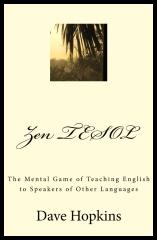
Early
Spring 2012
Zen TESOL
debut
by Robb
Scott, Ed.D.
Perseverance
in Lamar
by Robb
Scott, Ed.D.
Why Textbooks?
by Ashley
Green
Seeing David
Hopkins in
Riyadh
by Robb
Scott, Ed.D.
![]()
/Index/
/Letters/
/Profiles/
/Search/
/Podcasts/
![]()
Subscribe
for free!

Reflecting on the Teaching Experience
Announcing the Zen TESOL Book and Website
According to Oxford online dictionaries, "zen" is "a Japanese school of Mahayana Buddhism emphasizing the value of meditation and intuition rather than ritual worship or study of scriptures."
I have been fortunate to have enjoyed perhaps as many as 125 conversations in my life with Zen TESOL author David Hopkins, at settings ranging from tall office buildings in Tokyo to faculty cafeterias in Kasugai, Japan, and more recently over the Internet between Kansas and Thailand, and in person over morning lattes, at cardio exercises, and with the occasional steak dinner, in Riyadh, Saudi Arabia.
David Hopkins has been teaching English as an international language, and training English teachers, for nearly 45 years. He has lived and worked in Brazil, Botswana, Pakistan, Egypt, Japan, Thailand, and Saudi Arabia, in addition to being a native son of Vermont.
Dave has done Peace Corps training, materials development, refugee training, English for academic purposes, business English, and program development and management. In his illustrious career, he has been affiliated with the U.S. State Department, Georgetown University, Trinity London, the Fulbright Commission-U.S. Educational Foundation, World Learning, the School for International Training, the Consortium Refugee Projects, and the U.S. Peace Corps, in addition to a number of other institutions and organizations involved in international education. His bachelor's degree at Marlboro College, Vermont, was in Soviet studies.
David Hopkins is an avid and voracious reader, and much of that is now done on his Amazon Kindle. On any topic that comes up in conversation, he can be counted on to contribute an opinion based on personal experience or his own research, or, more often, a vividly presented combination of both.
I am continually enlightened through my dialogues with Professor Hopkins. As a result of our conversations in Japan, I gained awareness and confidence related to my own personal development as a language teacher. In our recent conversations--or should I say the continuation of the dialogue--in Riyadh, I understood in greater detail the dynamics of professional development and educational change in cross-cultural settings.
Most of all, however, a conversation with Dave Hopkins is always about personal change. He challenges you to reconsider your own assumptions and he motivates you to find effective ways to articulate your ideas.
When I saw a hard copy of his new "Zen TESOL" book recently, and started reading it, I realized that you can open to any page and find something worthwhile. These are vignettes and anecdotes intended not to provide you with "the answers," but rather to stimulate a thought process which results in you finding the answers that make sense in your current teaching situation. Reading this book is the closest thing to having an actual, face-to-face discussion with Dave himself (and I hope you get that opportunity very soon as well).
So this is not an objective, coldly analyzed review of a new book in the congested field of reading and writing that TESOL is today. Instead, I am suggesting to you that based on my own direct experience--both talking to Dave Hopkins and reading this book that he wrote--it will refresh your teaching spirit and help you re-examine your most basic beliefs about everything that goes into planning and implementing a classroom lesson.
I recommend Zen TESOL with no reservations whatsoever. I know you will enjoy it. Please note: Zen TESOL is also available for Kindle (Click here).
2012 ESL MiniConference Online
PDF conversion by PDF Online
Article by Robb Scott, Ed.D.
DrRobbScott@gmail.com